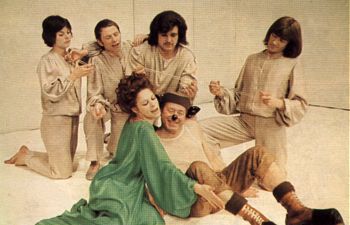Well, you never know what Peter Brook will do to amaze you until he does it. As the theatre's rogue elephant, he has taken a play acknowledged for 370 years to be romantically lovely and turned it into a circus performance.
And, as the theatre's rogue fairy, he has shown us how to do it so teasingly and gracefully that it delights the audience and respects the play.
Yes, he has amazed us again. And amazement is what the theatre is for.
How can you perform the Dream in a white walled circus ring in blinding light with trapezes flying overhead?
Why, the fairies, swinging over the heads of the mortals, are the trapeze artists.
The mixed up lovers, clawing each other up and down ladders in white bell bottoms and tie-and-dye dresses, are the tumblers.
And the rude mechanicals, bursting into the ring with their saws, planks, string vests and the roaring of Pyramus and Thisbe's lion, are the slapstick clowns.
Once you get used to it, it seems natural. It seems natural that Puck on a trapeze should pass the magic flower juice to Oberon in a spinning silver dish on the end of a juggler's silver stick.
It seems natural that the rhymed couplets of the lovers, with their student hairstyles, should be sung to a pop guitar as if they had stolen away, not to a wood near Athens, but to the Isle of Wight festival.


